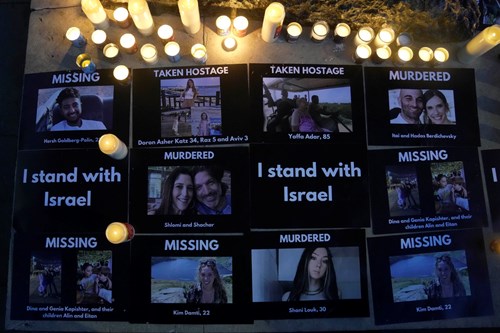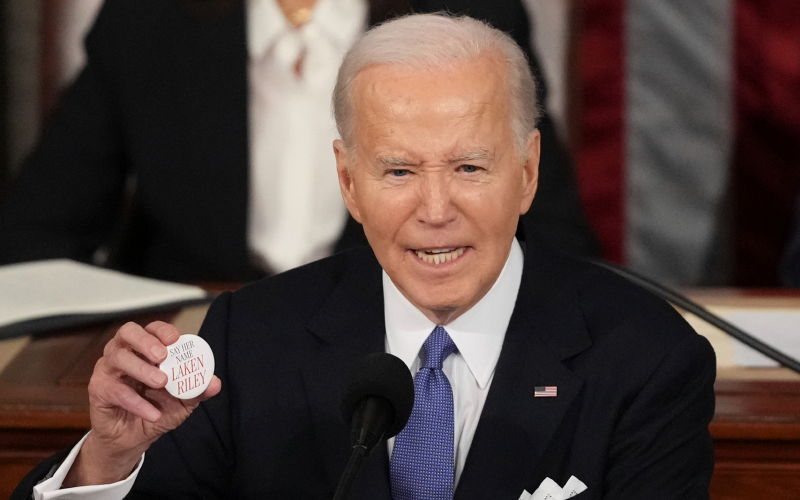Not in the sense that he or the nation of Israel is ready to lay down arms against Hamas terrorists, who murdered, raped and kidnapped more than 1,200 of its citizens on Oct. 7.
But in war you take light moments when you can find them.
 Netanyahu, the Israeli prime minister, bowed Monday for a moment of prayer with a devout Christian, Family Research Council President Tony Perkins, after an interview. When they finished, Netanyahu referenced the recent remarks of the U.S. president.
Netanyahu, the Israeli prime minister, bowed Monday for a moment of prayer with a devout Christian, Family Research Council President Tony Perkins, after an interview. When they finished, Netanyahu referenced the recent remarks of the U.S. president.
“He said, ‘You know what? I heard President Biden said I’d have a come-to-Jesus moment. Maybe this was it,’” Perkins recalled on Washington Watch Monday.
Reporting from Israel, Perkins told show host Jody Hice of visiting homes in a Kibbutz near the Gaza border, of seeing and feeling bullet holes in walls; seeing charred remains of homes; and listening to stories of survivors.
With or without the U.S.
While Netanyahu chooses his public words carefully regarding Israel’s relationship with America, he did make it clear to Perkins that a ceasefire with Hamas – an ongoing demand from President Biden – is not on the table. Netanyahu has the overwhelming support of his people with that stance.
“It is very clear: Israel is going forward. Israel is going to finish this war," Perkins said of his conversation with Netanyahu. "They are going to protect their borders. They care about their borders. They know what happens when their borders are not protected."
 That commitment to continue the war with Hamas, Perkins added, means ignoring strong allies such as the United States until Hamas is destroyed.
That commitment to continue the war with Hamas, Perkins added, means ignoring strong allies such as the United States until Hamas is destroyed.
The future of the U.S.-Israel relationship looks unclear given Biden’s public comments. His support seemed rock-solid in the days immediately after Oct. 7, but the narrative quickly turned against Israel from members of Congress, college campuses and other public spaces. Biden began to feel political pressure and his tune changed.
On Saturday, Biden made conflicting comments in an MSNBC interview when asked whether an Israeli invasion of Rafah – the last area of Gaza not taken by Israel Defense Forces and reported to hold more than a million Palestinian refugees – would be a “red line” in his relationship with Netanyahu. He responded with sort of a red line but with an asterisk.
“It’s a red line, but I’m never going to leave Israel. The defense of Israel is critical," Biden said. "So there’s no red line in which I’m going to cut off all weapons so they don’t have the Iron Dome to protect them."
Oct. 7 was like 9/11 attack
Prior to Saturday, Biden was caught on a hot mic visiting with like-minded politicians just after his State of the Union address last Thursday. He told Sen. Michael Bennett (D-Colorado) of his conversation with the Jewish head of state. “I told him, Bibi – don’t repeat this but you and I are going to have a come to Jesus,” meeting regarding the Palestinian humanitarian crisis.
 Biden told MSNBC, “In my view he’s hurting Israel more than helping Israel by making the rest of the world... it’s contrary to what Israel stands for, and I think it’s a big mistake. So I want to see a ceasefire.”
Biden told MSNBC, “In my view he’s hurting Israel more than helping Israel by making the rest of the world... it’s contrary to what Israel stands for, and I think it’s a big mistake. So I want to see a ceasefire.”
Biden won’t be getting that wish anytime soon, Perkins predicted, after he discussed with Netanyahu what the way forward might look like.
“The cabinet, the Israeli government, is unified," Perkins advised. "The Knesset voted 99-9 on a resolution saying that ‘We can't go down this path of creating an independent state for Palestine. It’s just not going to work.’ There’s no daylight here."
The Oct. 7 attack was like the 9/11 attack on America, Perkins said, so the country is currently more unified than ever before despite political differences with Netanyahu.

Understanding the resolve of the Israelis, Perkins said, requires understanding the nation’s history.
“They came here, going back to 1948, as a place of last resort, a place where they could be home, a place they could be safe," Perkins said. "I know there’s been conflict throughout the entire 76 years, but what happened on Oct. 7 was different. This was totally different, and all of that (peace) was shattered."







